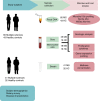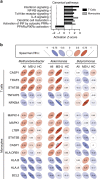Alterations of the human gut microbiome in multiple sclerosis
- PMID: 27352007
- PMCID: PMC4931233
- DOI: 10.1038/ncomms12015
Alterations of the human gut microbiome in multiple sclerosis
Abstract
The gut microbiome plays an important role in immune function and has been implicated in several autoimmune disorders. Here we use 16S rRNA sequencing to investigate the gut microbiome in subjects with multiple sclerosis (MS, n=60) and healthy controls (n=43). Microbiome alterations in MS include increases in Methanobrevibacter and Akkermansia and decreases in Butyricimonas, and correlate with variations in the expression of genes involved in dendritic cell maturation, interferon signalling and NF-kB signalling pathways in circulating T cells and monocytes. Patients on disease-modifying treatment show increased abundances of Prevotella and Sutterella, and decreased Sarcina, compared with untreated patients. MS patients of a second cohort show elevated breath methane compared with controls, consistent with our observation of increased gut Methanobrevibacter in MS in the first cohort. Further study is required to assess whether the observed alterations in the gut microbiome play a role in, or are a consequence of, MS pathogenesis.
Figures




Comment in
-
The multiple sclerosis microbiome?Ann Transl Med. 2017 Feb;5(3):53. doi: 10.21037/atm.2017.01.63. Ann Transl Med. 2017. PMID: 28251132 Free PMC article. No abstract available.
-
The chicken or the egg dilemma: intestinal dysbiosis in multiple sclerosis.Ann Transl Med. 2017 Mar;5(6):145. doi: 10.21037/atm.2017.01.18. Ann Transl Med. 2017. PMID: 28462225 Free PMC article.
References
Publication types
MeSH terms
Substances
Grants and funding
LinkOut - more resources
Full Text Sources
Other Literature Sources
Medical
Molecular Biology Databases

